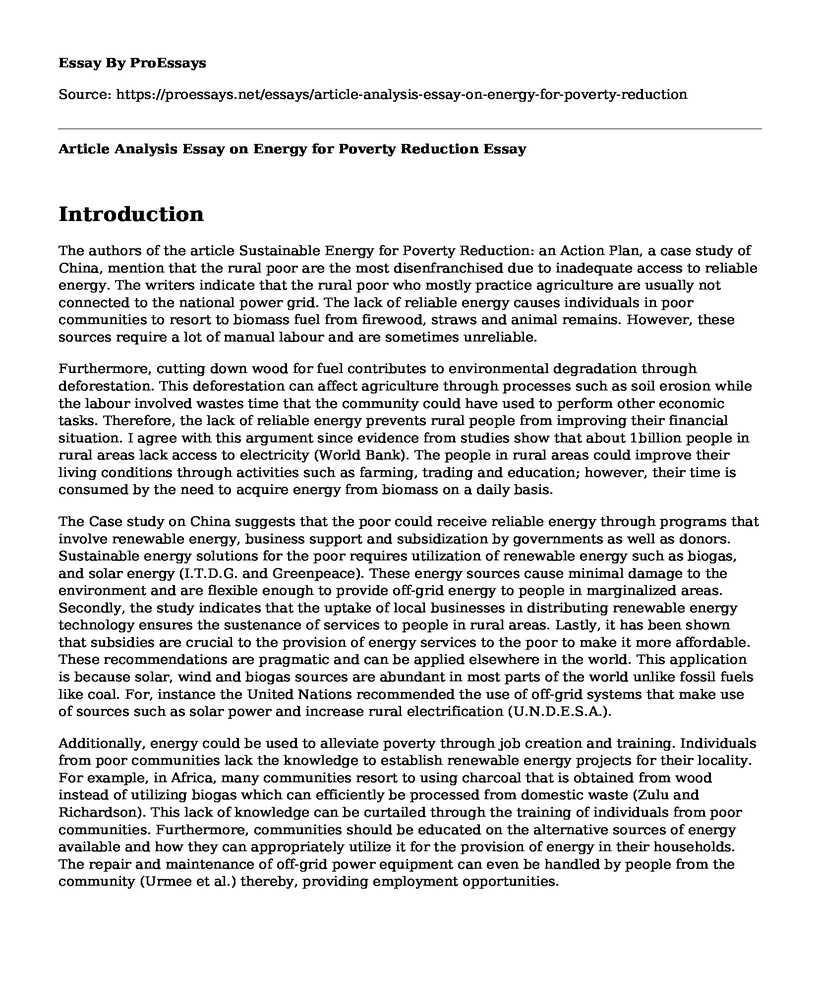Introduction
The authors of the article Sustainable Energy for Poverty Reduction: an Action Plan, a case study of China, mention that the rural poor are the most disenfranchised due to inadequate access to reliable energy. The writers indicate that the rural poor who mostly practice agriculture are usually not connected to the national power grid. The lack of reliable energy causes individuals in poor communities to resort to biomass fuel from firewood, straws and animal remains. However, these sources require a lot of manual labour and are sometimes unreliable.
Furthermore, cutting down wood for fuel contributes to environmental degradation through deforestation. This deforestation can affect agriculture through processes such as soil erosion while the labour involved wastes time that the community could have used to perform other economic tasks. Therefore, the lack of reliable energy prevents rural people from improving their financial situation. I agree with this argument since evidence from studies show that about 1billion people in rural areas lack access to electricity (World Bank). The people in rural areas could improve their living conditions through activities such as farming, trading and education; however, their time is consumed by the need to acquire energy from biomass on a daily basis.
The Case study on China suggests that the poor could receive reliable energy through programs that involve renewable energy, business support and subsidization by governments as well as donors. Sustainable energy solutions for the poor requires utilization of renewable energy such as biogas, and solar energy (I.T.D.G. and Greenpeace). These energy sources cause minimal damage to the environment and are flexible enough to provide off-grid energy to people in marginalized areas. Secondly, the study indicates that the uptake of local businesses in distributing renewable energy technology ensures the sustenance of services to people in rural areas. Lastly, it has been shown that subsidies are crucial to the provision of energy services to the poor to make it more affordable. These recommendations are pragmatic and can be applied elsewhere in the world. This application is because solar, wind and biogas sources are abundant in most parts of the world unlike fossil fuels like coal. For, instance the United Nations recommended the use of off-grid systems that make use of sources such as solar power and increase rural electrification (U.N.D.E.S.A.).
Additionally, energy could be used to alleviate poverty through job creation and training. Individuals from poor communities lack the knowledge to establish renewable energy projects for their locality. For example, in Africa, many communities resort to using charcoal that is obtained from wood instead of utilizing biogas which can efficiently be processed from domestic waste (Zulu and Richardson). This lack of knowledge can be curtailed through the training of individuals from poor communities. Furthermore, communities should be educated on the alternative sources of energy available and how they can appropriately utilize it for the provision of energy in their households. The repair and maintenance of off-grid power equipment can even be handled by people from the community (Urmee et al.) thereby, providing employment opportunities.
Works Cited
I.T.D.G., and Greenpeace. "Sustainable Energy for Poverty Reduction: an Action Plan." no. 65, 2002, pp. 31-41.
UNDESA. "Improving Sustainable Energy Access for Rural Areas." United Nations Department of Economic and Social Affairs, 8 Jan. 2014, www.un.org/en/development/desa/news/sustainable/rural-energy-access.html. Accessed 19 Sept. 2018.
Urmee, Tania, et al. "Issues related to rural electrification using renewable energy in developing countries of Asia and Pacific." Renewable Energy, vol. 34, no. 2, 2009, pp. 354-357.
World Bank. "Access to Energy is at the Heart of Development." World Bank, 18 Apr. 2018, www.worldbank.org/en/news/feature/2018/04/18/access-energy-sustainable-development-goal-7.
Zulu, Leo C., and Robert B. Richardson. "Charcoal, livelihoods, and poverty reduction: Evidence from sub-Saharan Africa." Energy for Sustainable Development, vol. 17, no. 2, 2013, pp. 127-137.
Cite this page
Article Analysis Essay on Energy for Poverty Reduction. (2022, Aug 03). Retrieved from https://proessays.net/essays/article-analysis-essay-on-energy-for-poverty-reduction
If you are the original author of this essay and no longer wish to have it published on the ProEssays website, please click below to request its removal:
- Cause and Effect of Cyber Bullying Essay
- Mobile Phone Addiction Paper Example
- Megan's and Jessica's Laws Essay
- Advocates for Child Abuse Victims Essay Example
- Essay Sample on Homelessness as Social Issue
- Essay Example on African American Inequality in Criminal Justice System
- Paper Example on Alcohol Use Disorder: Identifying Risk with AUDIT & T-ACE







